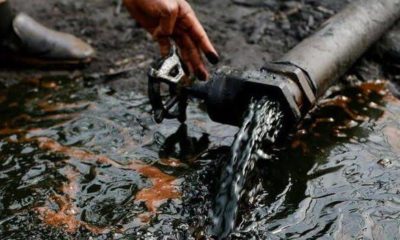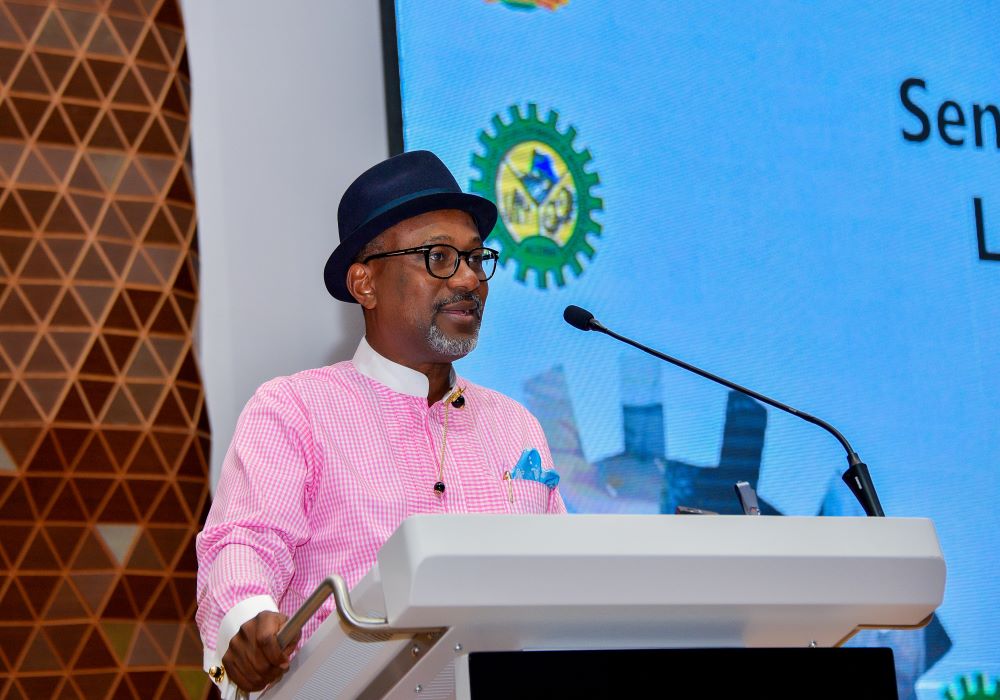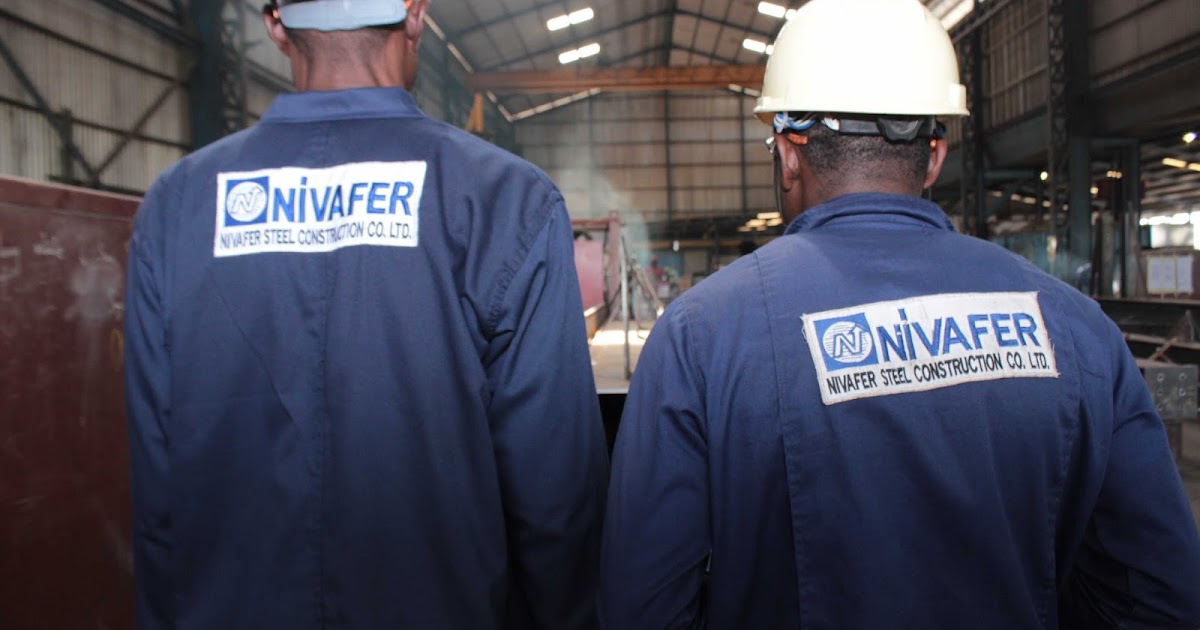Oil
SHELL collaborates with PETAN, foreign manufacturers on Nigerian content

By Yemie ADEOYE
LAGOS-THE development of indigenous manpower for the oil and gas industry received a boost last Friday as 40 engineering and geosciences graduates passed out from a one-year internship programme organised by the Shell Petroleum Development Company of Nigeria (SPDC) operated Joint Venture and Petroleum Technology Association of Nigeria (PETAN), a group of indigenous oilfield service companies.
The milestone occurred on the same day that SPDC JV performed the ground-breaking ceremony of its Original Equipment Manufacturers (OEM) domestication initiative, whereby the manufacturers and their Nigerian partners have been allocated land to set up local assembly plants and service centres at the Shell Industrial Area in Port Harcourt.

A cross section of the 2014/2015 beneficiaries of the Shell Petroleum Development Company of Nigeria Limited JV Internship programme at their graduation on Friday, October 30, 2015. The Annual Programme is sponsored by the SPDC JV in collaboration with the Petroleum Technology Association of Nigeria, PETAN, to build capacity of Nigerian Geology and Engineering graduates.
The internship programme introduced by SPDC JV in 2014 to support manpower development in critical disciplines equips graduates with vital industry experience for employment and continues with another batch of 40 graduates who are now attached to 20 PETAN companies.
In an address at the ceremony, Managing Director of the SPDC and Country Chair, Shell Companies in Nigeria, Mr. Osagie Okunbor, said: “I’m pleased at the successful completion of the programme by the first batch of 40 graduates who worked with 12 PETAN member companies. I’m even more pleased that, as envisaged, a number of them have been employed by the partner companies and others.” The MD was represented by SPDC’s General Manager, Projects, Toyin Olagunju.
Guy Kent, Senior Procurement Manager, Shell Upstream Nigeria said: “We are committed to developing Nigerian capability not because it feels good, but because it also makes good business sense. The partnership with PETAN is about giving the right people the chance to learn and actually start to contribute to the industry. It is the first rung of the ladder of development.”
The Executive Secretary of the Nigerian Content Development and Monitoring Board (NCDMB) represented by the Deputy Manager Human Capital Development, Mrs Michele Aiyegbusi, commended the SPDC JV for the internship initiative. She said: ‘What we see here today is the sort of thing that NCDMB will want to see in the industry—the collaboration between the operators and the service providers. NCDMB also runs an internship programme specifically in the earth sciences.”
Meanwhile, three foreign equipment manufacturers and their Nigerian partners participated in the ground-breaking ceremony. In 2012, SPDC entered into an agreement with the original equipment manufacturers and their Nigerian partners. Subsequently, land was allocated to them at the Shell Industrial Area in Port Harcourt. The ground-breaking ceremony marks site readiness and construction of the first three assembly and service facilities for valves, low voltage electrical panels, switch gears and instrumentation equipment.
“The ground-breaking ceremony is a significant head start towards the development of mini industrial parks,” said Mr. Okunbor at the ceremony. “It is a major milestone in our aspiration to domesticate our sources of supply as part of our Nigerian content journey to keep them closer to our operations and benefit from the shorter supply chain.”
The Executive Secretary, NCDMB, Mr. Denzil Kentebe, said: “SPDC was one of the first stakeholders to obtain approved from the Board for the OEM domestication programme. The vision ties into a similar plan by NCDMB to establish industrial packs in Yenagoa, Owerri and Calabar.”
The General Manager, Nigerian Content Development of SPDC, Mr. Chiedu Oba, in his remarks described the internship and the OEM domestication initiatives as a demonstration of “the long term commitment of Shell Companies in Nigeria to Nigerian content development. It is a key sourcing principle that is woven into the fabric of our business”.
Oil
NNPC Discovers Over 4,800 Illegal Pipeline Connections

The Nigerian National Petroleum Company (NNPC) Limited has revealed the detection of more than 4,800 unauthorized connections on oil pipelines within the country, painting a troubling image of the nation’s primary source of revenue.
Mele Kyari, the Group Chief Executive Officer of NNPC Ltd, communicated this information to the Senate Committee on Appropriations last Friday.
He said, “We have over 4,800 illegal connections on our pipelines. That means in some lines, within 100 kilometres of pipelines, you have as much as 300 insertions.
“Therefore, even when you produce the oil, you cannot deliver them at the required pressure and therefore the volume will also be less.”
As per the NNPC Ltd chief, individuals from various regions enter the Niger Delta, inserting unauthorized connections on pipelines in Nigeria’s oil-producing area.
This recent revelation follows a prior discovery of 295 illegal connections to the pipelines by the firm a year ago, underscoring the escalating issue of crude oil theft in Nigeria.
Two years earlier, Kyari had highlighted the country’s daily loss of 200,000 barrels of oil, amounting to $13 million due to theft and vandalism.
He further stated “We have two sets of losses, one coming from our products and the other coming from crude oil. In terms of crude losses, it is still going on. On the average, we are losing 200,000 barrels of crude every day.”
After the discovery, Nigeria’s security forces pledged to enhance security around the country’s pipelines.
To bolster this, the Federal Government granted a multi-billion naira pipelines surveillance contract to Tantita Security Services, headed by former militant leader Government Ekpemepulo, also known as Tompolo.
Despite facing criticism for this decision, Senator Heineken Lokpobiri, the Minister of State for Petroleum, remains convinced that it was the appropriate course of action.
In August, following a tour of oil facilities in the Niger Delta, Senator Heineken Lokpobiri expressed gratitude to Tantita, commissioned by NNPC Ltd, for their ongoing work.
He also hinted at plans for further extensive endeavors in the future.
In 2021, after extensive debate and delays, the Petroleum Industry Bill was finally passed to attract increased foreign investment into the oil sector through amendments to regulations, royalties, and taxes.
Oil
Dangote Refinery Set To Begin Fuel Production With First Crude Arrival

Nigeria’s colossal $19 billion Dangote Refinery, after encountering several setbacks, is on the verge of kickstarting fuel production.
This achievement is heralded by the arrival of the first crude shipment, transported by the OTIS tanker carrying 950,000 barrels of Nigeria’s Agbami crude.
S&P Global, citing industry sources and tanker tracking data on spglobal.com, reported the tanker’s departure on December 6, en route to Lekki, the nearest land port to Dangote’s offshore crude receiving terminal.
Scheduled to reach its destination around 8 PM on December 7, the arrival of this shipment signifies the commencement of crude supplies for the refinery’s operations.
Chartered by the state-owned Nigerian National Petroleum Company (NNPC), the Suezmax tanker is an emblem of the initial crude supply to Dangote’s cutting-edge refinery, as disclosed by a West African oil trader familiar with the matter in the S&P report.
Even though the refinery was officially completed in May, the absence of domestic crude feedstock had hindered oil product manufacturing.
To address this, the NNPC, holding a 20% stake in the refinery, struck an agreement to provide 6 million barrels of crude oil as feedstock to the Dangote refinery in December.
This move aims to jumpstart operations and overcome the previous impediments.
Agbami, operated by Chevron, holds a prominent position among Nigeria’s major deepwater developments, producing around 100,000 barrels per day in the central Niger Delta.
Known for its light sweet crude qualities, with a specific gravity of 47.9 API and a low sulfur content of 0.04%, Agbami produces substantial amounts of naphtha and kerosene.
NNPC has chartered additional shipments from different Nigerian offshore fields to the refinery, marking the start of a sequence of planned crude supplies for the month, as mentioned by the oil trader.
Located on the outskirts of Lagos, Nigeria’s commercial hub, the Dangote Refinery encountered repeated delays since its 2013 announcement, despite significant installation progress in 2019.
The refinery, designed to handle multiple crudes simultaneously, targets three Nigerian crude grades—Escravos, Bonny Light, and Forcados. When operating at full capacity, it aims to produce 327,000 barrels per day (b/d) of gasoline, 244,000 b/d of gasoil/diesel, 56,000 b/d of jet fuel/kerosene, and 290,000 metric tons per year of propane/LPG.
Dangote’s operations starting signify Nigeria’s hopes to lessen its reliance on gasoline imports, addressing the deficiencies of its existing refineries undergoing repairs. This shift is poised to reshape Nigeria’s oil industry, potentially leading to gasoline self-sufficiency by the 2040s.
Dangote officials anticipate an initial output of 370,000 barrels per day (b/d), emphasizing jet fuel and diesel production.
Industry analysts, however, project the refinery to reach its full operational capacity by mid-2025, although potential delays remain a looming concern.
Oil
NNPCL Sets Dec 2024 Terminal Date For Fuel Importation

The Nigerian National Petroleum Company Limited (NNPCL) has announced intentions to cease importing refined petroleum products by December 2024, anticipating full operational functionality for all national refineries by that time.
Group CEO, NNPC Ltd, Mele Kyari, shared this at a meeting with Speaker Tajudeen Abbas of the House of Representatives, who advocated for the privatisation of Nigeria’s refineries on Thursday.
Projections indicated the national oil firm’s revenue could climb to N4.5 trillion by the conclusion of 2023. Moreover, the rehabilitation of the Port Harcourt Refining Company, managed by NNPCL, was slated for completion by December of the current year.
Meanwhile, Oil marketers verified on Thursday that the Port Harcourt refinery is set for operations, potentially starting in January 2024. They emphasized that once operational, this refinery could notably reduce the prices of refined petroleum products.
During the meeting in Abuja, Kyari asserted Nigeria’s intention to cease importing refined petroleum products by 2024, envisioning the country’s emergence as a net exporter of these commodities within the same year.
He outlined the plans for launching operations at the Port Harcourt, Warri, and Kaduna refineries.
Kyari reiterated that all refineries would operate at full capacity, ultimately paving the way for Nigeria to transition into a net exporter of petroleum products by the conclusion of 2024.
He attributed the inactivity of Nigeria’s refineries over the years to the petroleum subsidy, emphasizing that the removal of this subsidy was drawing significant private-sector investments into the sector.
Kyari said “I can confirm to you that by the end of December this year, we will start the Port Harcourt refinery; early in the first quarter of 2024, we will start the Warri refinery and by the end of 2024, Kaduna refinery will come into operation.
“This is the commitment we are giving today and you can hold us accountable for this. In 2024, many of the initiatives including the rehabilitation of our refineries and also the efforts of small-scale refineries, and the upcoming Dangote refinery, will make Nigeria a net exporter of petroleum products in 2024.
“We will no longer be talking about fuel importation by the end of 2024. I am very optimistic that this will crystallise.
Kyari promised that by the conclusion of 2023, the government’s anticipated revenue from the company would reach N4.5 trillion, emphasizing NNPCL’s adherence to the Petroleum Industry Act and its commitment to delivering value to shareholders.
Recall that in October 2023, it was reported that Nigeria’s monthly spending on the importation of Premium Motor Spirit, known as petrol, had reached approximately N843 billion due to NNPCL’s cessation of oil swaps.
In July of this year, the Nigerian Midstream and Downstream Petroleum Regulatory Authority reported that during the post-deregulation period, spanning June 1 to June 28, 2023, the country’s total petrol consumption amounted to 1.36 billion litres, with an average daily consumption of 48.43 million litres.
The average ex-depot price of petrol, sourced solely from NNPCL as the importer, stands at about N580 per litre.
However, both NNPCL and oil marketers declared on Thursday that this substantial oil import expenditure would soon diminish.
They anticipated a drop once the Port Harcourt refinery commences production of refined petroleum products from January 2024, barring any unforeseen circumstances.



















